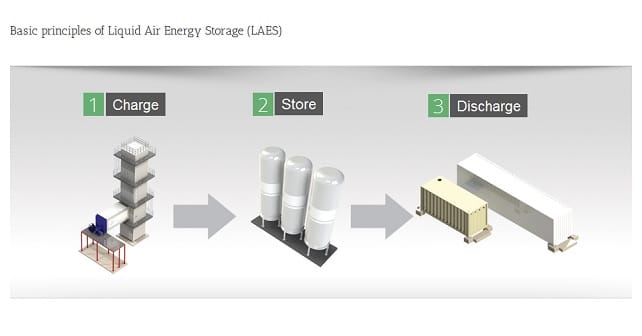UK bets £8 million on liquid-air energy storage

Two British companies have received more than £8 million in government funding to develop liquid-air-based technology for energy storage.
Viridor Waste Management Ltd. and Highview Power Storage won the funding through a UK Department of Energy and Climate Change competition to support energy storage technology research and development.
The companies will work on a technology that stores energy by compressing air into liquid form. The stored energy can then be tapped to provide electricity to the grid during times of high demand.
Air turns to liquid when chilled to -196 degrees C. By storing the liquid air in large vessels, Highview Power Storage can use it to generate electricity on demand: exposing the liquid air to ambient temperatures causes it to rapidly expand and turn back into a gas, and this process can be used to drive a turbine to generate electricity.
National Grid expects to test the technology to see how stored energy can help balance supply and demand.
“With ever growing pressure on natural resources, it is essential that we develop innovative and sustainable methods to generate and store energy not only to cut down our carbon footprint but to ensure long-term energy security,” said Ian McAulay, chief executive of Viridor, which collects and sorts waste for recycling and energy generation.
Highview works to develop large-scale energy storage systems for utilities and power systems operators. Its LAES (for “liquid air energy storage”) plants can be designed with capacities from 5 megawatt-hours (MWh) to 1,000 MWh.
Currently, almost all electricity on the UK grid is generated on demand. This means power plants must be fired up to meet peak demand even if that demand lasts only a short period of time. As a lot of electricity comes from coal-fired power plants, this approach can be highly carbon-intensive.
If more energy from clean and renewable sources could be stored and easily tapped in times of need, the UK could help reduce its carbon emissions while also improving its energy security.




